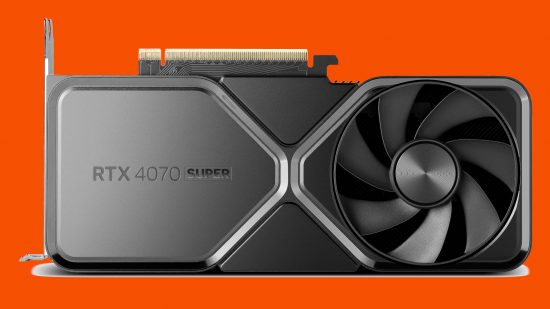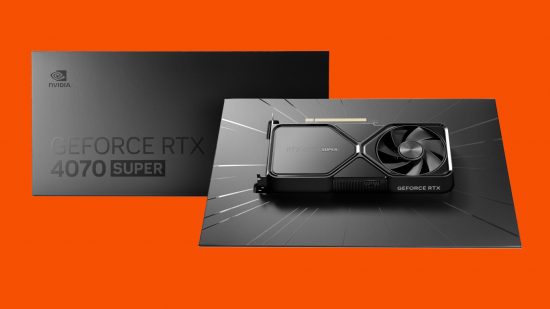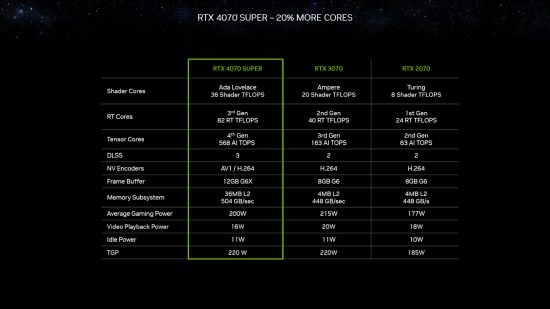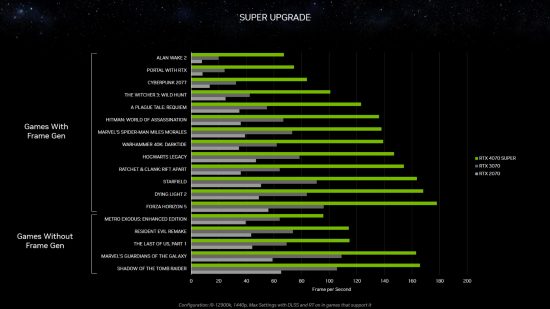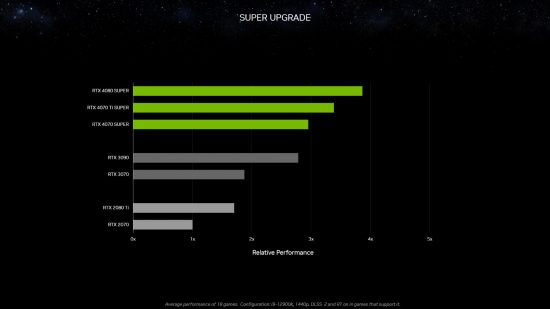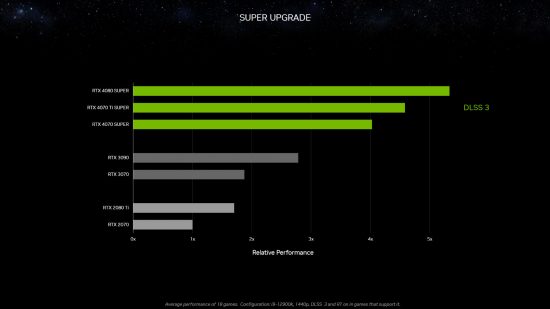When was the Nvidia GeForce RTX 4070 Super release date?
Leading the charge, the GeForce RTX 4070 Super was the first of three new RTX 4000 Super graphics cards to arrive from Nvidia in January 2024. It has proved to be an impressive card – as have the other RTX 4000 Super GPUs – providing a much needer shakeup in the mid-tier graphics card market.
Having impressed is in our RTX 4070 Super review, the new card has earned a spot on our best graphics card guide alongside the RTX 4080 Super, knocking the previous champion, the GeForce RTX 4070, from its perch. Announced at CES 2024, alongside other Super pixel pushers, here’s the lowdown on the new Nvidia GPU.

When was the Nvidia GeForce RTX 4070 Super release date?
The Nvidia GeForce RTX 4070 Super release date was on January 17, 2024, during Nvidia’s CES 2024 press conference.
The 4070 Super was the first of the GeForce RTX 40 Super graphics cards to launch, with the GeForce RTX 4070 Ti Super arriving the week after (January 24) and the GeForce RTX 4080 Super following suit (January 31).
This refresh comes less than a year after the launch of the GeForce RTX 4070, which arrived on the scene in April 2023. However, unlike the other Super graphics cards, the GeForce RTX 4070 Super will coexist with the vanilla model, albeit at different price points.
What is the Nvidia GeForce RTX 4070 Super price?
The GeForce RTX 4070 Super price is $599, making it the cheapest graphics card of the three RTX 40 Super series.
The original GeForce RTX 4070 Super now has an MSRP of $549, creating a $50 gap between the two graphics cards. This keeps both of them in direct competition with the Radeon RX 7800 XT ($499), and maintains the sizeable $200-250 barrier to the GeForce RTX 4070 Ti Super.
While there’s no GeForce RTX 30 series Super cards to compare to, this strategy of mirroring the non-Super card’s price was repeated with the GeForce RTX 20 Super graphics cards. For example, the GeForce RTX 2070 Super launched at the same $499 MSRP as the outgoing GeForce RTX 2070.
What are the Nvidia GeForce RTX 4070 Super specs?
The most notable GeForce RTX 4070 Super spec upgrade is its significantly increased CUDA core count, in addition to additional RT and Tensor cores. Otherwise, it’s largely the same as the original non-Super graphics card.
| GeForce RTX 4070 Super | GeForce RTX 4070 | |
| GPU | AD104 | AD104 |
| CUDA Cores |
7,168 | 5,888 |
| RT Cores |
56 | 46 |
| Tensor Cores |
224 | 184 |
| Base clock |
1,980MHz (1.98GHz) | 1,920MHz (1.92GHz) |
| Boost clock | 2,475MHz (2.48GHz) | 2,475MHz (2.48GHz) |
| VRAM | 12GB GDDR6X | 12GB GDDR6X |
| Memory bus width | 192-bit | 192-bit |
| TGP | 220W | 200W |
| MSRP | $599 | $549 |
Side-by-side, there are only a few but nonetheless notable differences between the GeForce RTX 4070 Super and its sibling. The most significant is undoubtedly its 7,168 CUDA cores, up from 5,888, representing a 22% increase and falling just shy of the original GeForce RTX 4070 Ti.
Both Tensor and RT cores also receive a small bump, which should improve AI and ray tracing performance, respectively. While its boost clock remains the same as the GeForce RTX 4070, the Super graphics card does enjoy a modest 60MHz advantage in terms of base clock.
The GeForce RTX 4070 Super is also slightly more power hungry, with a TGP of 220W, but this increase of 20W shouldn’t be any cause for concern really.
Nvidia GeForce RTX 4070 Super benchmarks
Nvidia has released its own benchmarks for the GeForce RTX 4070 Super, which show it to be more powerful than a GeForce RTX 3090, though our own review results paint a slightly different picture.
Further comparisons from Nvidia to previous generation models suggest the GeForce RTX 4070 Super will provide performance just shy of 300% greater than a GeForce RTX 2070. It’s worth bearing in mind, however, that this is with DLSS 2 enabled, with Frame Generation providing an even greater benefit in supported games.
For our full low down on the RTX 4070 Super, check out our RTX 4070 Super review with comprehensive benchmarks including ray tracing and non-ray tracing results alongside DLSS and non-DLSS testing.
